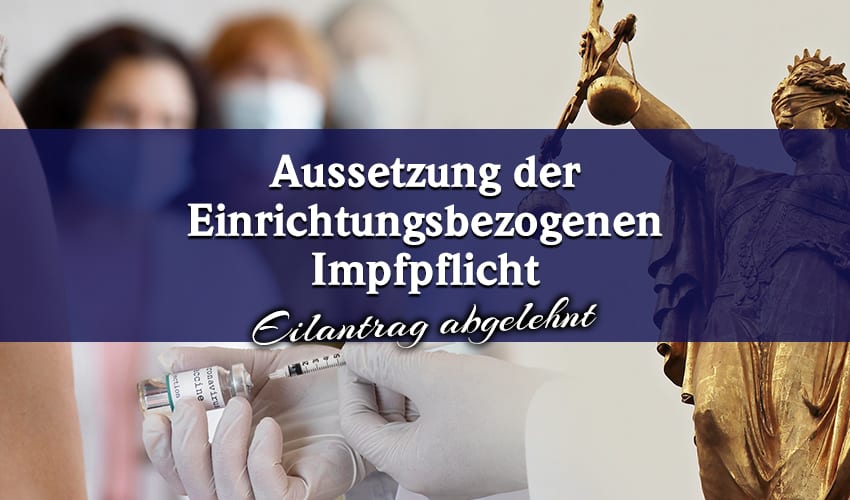
Facility-based compulsory vaccination: Karlsruhe rejects urgent application
The judges of the Federal Constitutional Court have rejected an urgent application calling for the suspension of the facility-based vaccination requirement in the care and healthcare sector. The first senate justified its decision by weighing up the consequences of the law coming into force or not. This consideration was to the detriment of the plaintiffs.
On December 10, 2021, the Bundestag and Bundesrat passed a facility-based vaccination requirement in the care and healthcare sector. Almost all parties represented in the Bundestag approved the plan of the federal government consisting of the SPD, Greens and FDP. In the so-called "Act to Strengthen Vaccination Prevention against COVID-19", the traffic light parties, with the support of the CDU/CSU, stipulate that healthcare employees must submit proof of vaccination or recovery to their employer by March 15, 2022. It is also possible to present a medical certificate.
The decision resulted in a veritable wave of complaints at the Federal Constitutional Court in Karlsruhe. By the beginning of February 2022, 74 constitutional complaints had already been received from 300 plaintiffs. The plaintiffs included many healthcare workers who had not been vaccinated against the coronavirus.
On February 10, 2022, the Karlsruhe judges ruled that the urgent applications were rejected. A final review of constitutionality will therefore only be carried out in the main proceedings.
Federal Constitutional Court with impact assessment
The judges in Karlsruhe justified their decision by weighing up the consequences. They compared the consequences of temporarily introducing compulsory vaccination with the consequences of temporarily suspending it. The First Senate came to the conclusion that the facility-based vaccination requirement did not justify any constitutional concerns. Due to the continuing high and dynamic incidence of infection, there is a particular risk for the so-called vulnerable groups, i.e. older people and those with previous illnesses:
"The very low probability of serious consequences of vaccination contrasts with the significantly higher probability of harm to the life and limb of vulnerable people," said the judges in Karlsruhe.
Karlsruhe judges also point to effects of vaccination
On the other hand, the judges also emphasized that the vaccination could have consequences for the individual citizen. Vaccination can affect physical well-being and serious side effects are also possible. In the worst cases, these could even be fatal. Furthermore, the vaccination cannot be reversed even if a constitutional complaint is later successful.
However, the law that has been passed does not inevitably require people to be vaccinated. The judges considered a temporary change of job for those affected to be acceptable:
"The plaintiffs have not shownthat the professional disadvantages that may occur in the limited time until the decision on the constitutional complaint are irreversible or can only be reversed with great difficulty or are otherwise very serious". This was also not apparent for the period described, the First Senate ruled.
What does the ruling mean in concrete terms?
The decision of the Federal Constitutional Court means that, for the time being,all persons working in medical and care facilities and companies must submit proof of vaccination, recovery or a medical certificate to the responsible management by the end of March 15. After this date, this proof must also be submitted to the competent authority, i.e. the public health department, if requested.
Employees and employers may be fined for non-compliance. However, this is always decided on a case-by-case basis and depends on the decision of the responsible health authority.







